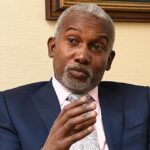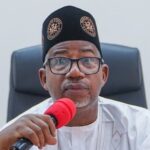By Abdullahi D Mohammed
For an entity to assume the status of sovereignty, it must have among other things, defined and delineated borders and territorial boundaries and a population and government, which should be the symbol of authority and power.
Writing in the 17th century, English philosopher, John Locke, posited that, citizens, cede some of their rights in order to build and live in a civil or state-structured society, where governments protect their rights to life among other things.
- 2023 budget: N/Assembly mulls Finance Act amendment over N11trn deficit
- None of our staff earns up to N1m, PenCom clarifies
Nigeria is not an exception to this informal globalised concept.
The country’s porous borders and numerous ungoverned spaces have dire consequences, some of which are directly linked to an existential threat, both in terms of sovereignty and security.
Most border states and communities around the country had minimal government presence, while in some, governance is non-existent, making such communities easy prey for criminal elements who used them as vassals, or fortresses to keep citizens in perpetual fear and anxiety.
Almost all conflicts in the country — banditry, kidnap for ransom, and other forms of terrorism are inordinately carried out on the fringes of border communities whose territories had been in limbo and ungoverned for decades.
As the 2023 election draws closer, chances are political participation or voting in these areas is increasingly becoming unlikely. For instance, in some communities bandits had banned or restricted all forms of political activities. Such an affront on the sovereignty of the country is a total violation of the rights to life, citizens exchanged for protection and political inclusiveness or participation.
Displaced populations across the country, as a result of conflict and terrorism, especially in the North, would automatically be disenfranchised in the coming elections.
INEC is mulling an ambitious plan of allowing displaced persons to vote in the 2023, elections. As at April 2022 the United Nations High Commissioner for Refugees, UNHCR said there were about 3.2 million Internally Displaced Persons (IDP) in the country. While it might be preposterous to neglect such figures, the daily needs or priorities of displaced persons, far outweighs the need to vote in the coming elections. To them, political participation holds little significance, after all, the system failed to provide one of the most auspicious principles democracy is known for — freedom of association.
After elections and the formation of a new government, governance is intrinsically restricted to big cities, neglecting the numerous villages which are bereft of basic social amenities and infrastructure making them vulnerable. The implication is youths in such communities become a ready tool for all kinds of manipulations.
Seemingly, the elixir to incessant security challenges and its attendance consequences is — granting local government full autonomy.
No matter how befuddling it may sound, the local government is the only tier of government with a direct bearing on local communities, businesses and traditional institutions.
The 1976 Local Government Reform would have been the best thing to ever happen to local government administration in the country, had the role of traditional institutions and rulers not been expunged.
Pre-independence administration recognises the significance and role traditional institutions and leaders play in safeguarding communities and having in place, an elaborate disputes settling mechanism. Without even technology to aid in administration, those leaders were able to take effective control of their spaces regardless of the distance. No community, no matter how remote, was ever left ungoverned.
Community-based feedback system was in place, to monitor which strangers entered a territory. In any case, such stranger(s) would undergo scrutiny to ascertain his true identity, motive and mission, before being accepted into the community.
Activities of armed bandits are carried out in ungoverned areas which suffer neglect from successive governments. If local councils, and by extension, traditional institutions had their pristine role well defined and allowed some autonomous powers to govern the elaborate feedback system will keep tabs on activities that go on in local and border communities.
We must be acutely aware, that as the 2023 elections draw nearer, two fundamental freedoms have been taken away from citizens — the right to vote and the right to life.
Displaced populations would bother less about elections or voting because the ambience for such isn’t just right.
Displaced populations would rather ponder on what becomes of their abandoned farmlands, which provides them a guaranteed yield and better livelihoods, against the meagre handouts from insincere managers of IDP camps and centers.
Displaced populations would innately be more concerned about the education of their children which is under threat, they would bother about healthcare, shelter and other frills required to live a normal life.
While the government might cite the ECOWAS Protocol on Transhumance, which is a framework for diplomatic and economic integration within the sub region, as a mitigating factor against taking full ownership and control of borderlands, nonetheless, the overall desire to protect citizens should be a top priority. The framework should be reviewed in tandem with the present reality and gravity of our situation.
A remarkable panacea for curbing the lingering security challenge is taking effective control of territories, spaces, and communities. Government presence must be visible, not in terms of infrastructures alone, but by enhancing an elaborate model of a feedback system and a tripartite synergy between, community/religious leaders – security – traditional leaders.
We cannot afford to continue to ignore the significance of governance at the lowest level, because it remains the closest to the people.
Mohammed wrote from Kano
 Join Daily Trust WhatsApp Community For Quick Access To News and Happenings Around You.
Join Daily Trust WhatsApp Community For Quick Access To News and Happenings Around You.


